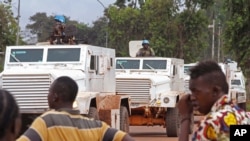The U.N. envoy to the Central African Republic says he has called on the Security Council to loosen an arms embargo amid worsening lawlessness in the capital, Bangui, that threatens to further delay elections and jeopardizes a planned visit by Pope Francis.
The council imposed the embargo on CAR in December 2013 after Muslim Seleka rebels seized power in the majority Christian nation earlier that year, spurring reprisal attacks from mainly Christian anti-balaka militias.
The Seleka later handed power to the transitional government under international pressure. Transitional President Catherine Samba-Panza has long called for changes to be made to the embargo to make it easier to arm government security forces.
The current U.N. embargo, due to be renewed in January, allows government security forces to be trained and equipped with weapons and other gear if approved by a U.N. Security Council sanctions committee.
U.N. envoy Parfait Onanga-Anyanga said in a statement Wednesday that he was aware of Samba-Panza's view of the arms embargo and that he had written to the council sanctions committee to ask for "a loosening of the measures and the reinforcement of interior security forces."
But Onanga-Anyanga's letter, seen by Reuters on Thursday, does not ask for any changes to be made to the arms embargo. It requests approval from the committee for a delivery of 80 helmets and bulletproof vests and 30 rifles for CAR security forces. It also asks for U.N. peacekeepers to be allowed to train some CAR forces in crowd control.
"You may be aware of the deteriorating situation in Bangui over recent weeks. With elections pending, and the planned visit by the pope, we are keen to improve the security situation as quickly as possible," Onanga-Anyanga wrote.
Rearming the military
Militia attacks and tit-for-tat violence have killed about 90 people since September, prompting calls from politicians and civilians to rearm the military. The interim government has yet to rearm it after officers were linked to Christian militias.
The CAR police and gendarmerie carry weapons, and a 12,000-strong U.N. peacekeeping mission has been deployed there since September 2014.
Pope Francis is due to visit the country this month but has signaled his trip could be canceled if the violence worsens. Elections, originally set for October 18, are now scheduled for December 13.
U.N. forces said Wednesday that anti-balaka militias attacked a convoy they were escorting, wounding two peacekeepers and a civilian driver. Witnesses said three civilians were killed when peacekeepers returned fire.
The U.N. mission is investigating civilian casualties, a U.N. peacekeeping official said.





